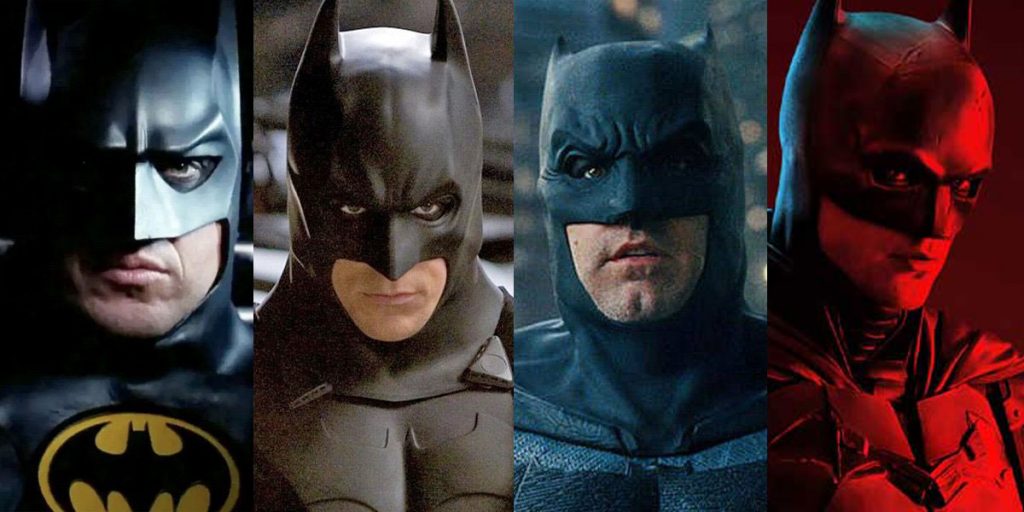Now that The Batman has hit theaters, we’ve updated our ranked list of all the Batman feature films, adding Robert Pattinson’s effort as the Caped Crusader.
Well, we got what we (I) asked for: Matt Reeves’ The Batman hit theaters to mostly widespread acclaim, not to mention the best box office numbers of 2022 thus far. Since its release, a couple of viewings, and enough time in between to give it a good think, we’ve updated our list of Batman feature films, ranked from worst to best, to include this newest entry in the Batverse (Is that a thing? It is now.) Read on to check out where Robert Pattinson’s moody emo dark knight falls on our list…
Caveat: There are a ton of films featuring the world’s greatest detective, especially of the animated variety, so the criteria of this list is such that the films A) feature Batman as the primary protagonist (or one of them); B) are feature-length; and C) were theatrically released (with one slight exception) at some point.
13. BATMAN FOREVER
1995
Director: Joel Schumacher
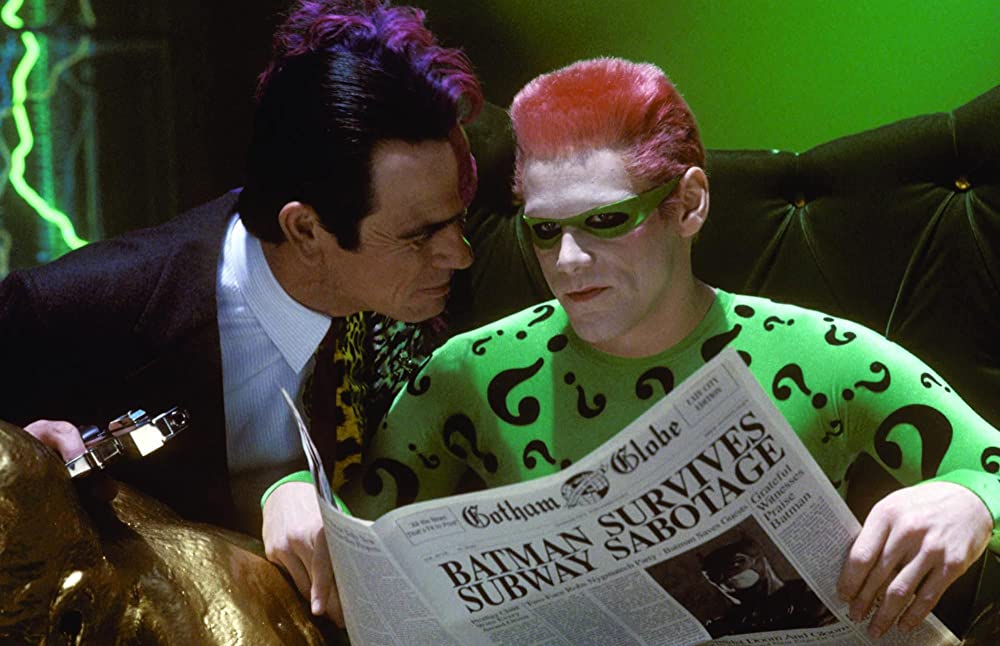
Joel Schumacher brings some much-needed homoeroticism to the Batman canon, and that’s about the only good thing he brings to the table in 1995’s abysmal Batman Forever. Warner Bros.’ decision to pivot from the darker trenches of Tim Burton-land to the poppier, neon-drenched, kid-friendly(?) tone that Schumacher unleashed did not stick the landing. What Schumacher gets up to in his subsequent Batman entry (more on that later…) is of a clearer, more focused vision, but this one feels like it’s got one foot stuck in the shadows of Tim Burton’s nightmare carnival and the other foot in… “let’s get butts in seats”-ville.
Val Kilmer’s Batman is too stiff and his Bruce Wayne is mind-numbingly boring. Tommy Lee Jones’ Two-Face is possibly the worst performance of his career. And Jim Carrey’s shtick is even too much; it’s as if Schumacher saw his previous work and said, “hey, yeah, can you do all that but instead of being entertaining, be as annoying as humanly possible?” These three, plus everyone else, are otherwise solid if not wildly talented performers, but the script is subpar at best and this entry overall is so egregiously misguided that, at the end of the day, there’s nothing for those actors to work with, deeming this the least memorable, most unsuccessful entry in the Batverse.
MVP: Elliott Goldenthal, the composer for both of Schumacher’s Batman films, had some big shoes to fill when taking over the musical reins from Danny Elfman. But Goldenthal’s orchestral efforts are solid and far and away the best part of a film that never has much going for it.
Best Quote: It’s not from the film itself, but from a behind-the-scenes story that’s been passed down over the years. Apparently, Tommy Lee Jones (whose phoned-in performance gives us every indication that he was in this simply because Warner Bros. money was green) did not have a great time with Jim Carrey on set and, at one point, said to him straight-up: “I simply cannot sanction your buffoonery.”
12. BATMAN
1989
Director: Tim Burton
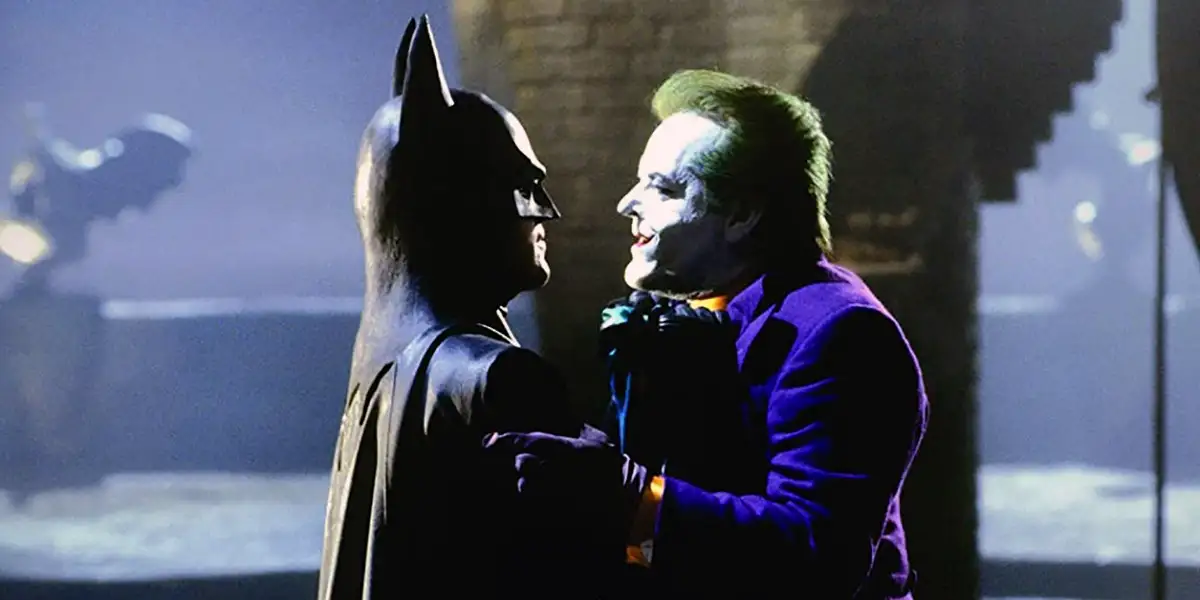
 loudandclearreviews.com
loudandclearreviews.comIt’s hard to look past the retrospective kitschiness of this one’s quality of filmmaking, but damn if Jack Nicholson isn’t having the time of his life. Tim Burton’s Batman features Nicholson as the Joker and Michael Keaton as Bruce Waye/Batman, and those two performances alone are the reasons to watch this; that is, if you didn’t grow up obsessing over it like so many of my contemporaries did. To the best of my recollection, my first onscreen Batman was George Clooney, so the two Burtons and first Schumacher entries are less rooted in my youthy subconscious than others. I know people who will die on the hill of Michael Keaton being their/the best Batman and, to their credit, he’s wonderful. To each their own. His Bruce Wayne– in all his awkward human-ing– is one of the better depictions of the character on screen.
Bruce Wayne’s perspective that he himself is the alter ego of Batman (and not the other way around) is an oft-brushed over core tenet of the character, but Burton and Keaton’s keen commitment to the character’s DNA eliminate any possibility of what has often turned out to be a flaccid, milk toast, and ultimately boring Bruce Wayne. Keaton nails that half of the character, though, and there’s an argument to be made that he understand it better than any other actor that’s donned the cowl since– or, rather, taken it off.
Best Quote: “You wanna get nuts? C’mon, let’s get nuts…” As I just finished gushing about, Michael Keaton’s performance as Bruce Wayne might be the best we’ve ever gotten from an actor, and this line in particular is a prime example of him having a ton of fun without ever going too far off the rails.
11. BATMAN BEGINS
2005
Director: Christopher Nolan
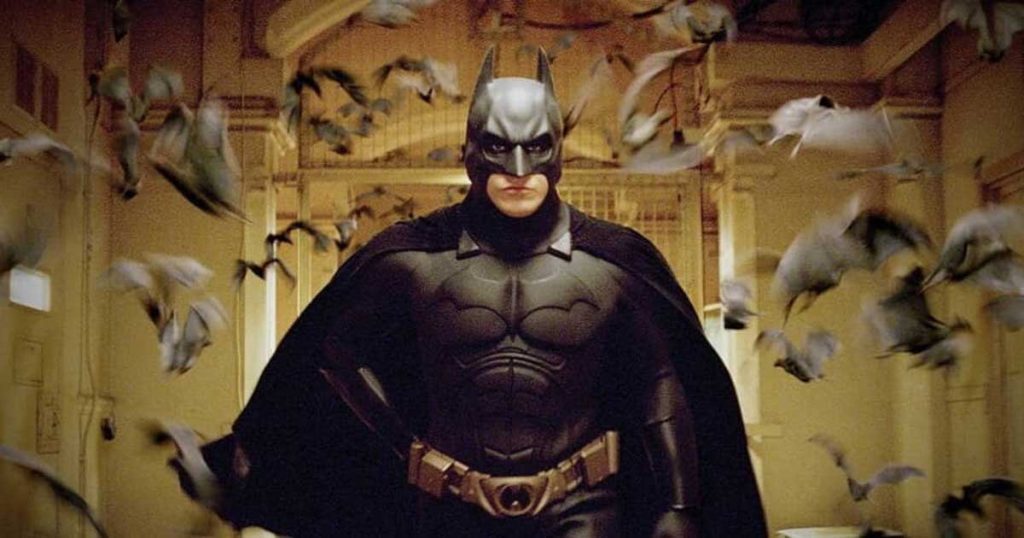
On its own, Batman Begins is a formidable entry into the Batman cinematic canon. In 2005, we hadn’t quite reached the superhero fatigue ushered in by the early days of the MCU, but there was something decidedly off about superhero efforts at that point that Christopher Nolan’s vision of Batman’s world retconned the moment it burst onto the scene. It’s the last great Batman origin story, the success of which necessitates that another filmmaker need not explore that period of Batman’s life for, I don’t know, should we that statute of limitations can run out in, like, 20 more years? I’m all for filmmakers making not only more Batman films, but all different versions in all different “universes” (since that’s what we’re calling them now). But Nolan’s first entry in his Dark Knight trilogy is the hands-down the best origin story we’ve gotten.
Despite all that praise, it doesn’t hold a candle to what comes next. The Dark Knight and The Dark Knight Rises were juggernauts, effectively punting Batman Begins out of the habitable zone and into the icy cold recesses of space. I’m being dumb because I’m writing this at 1 in the morning and I’m sleepy, but do you know what I mean? Batman Begins is a fantastic film, with a solid script and wonderful performances to boot. If we were able to somehow let this one exist in a vacuum outside of a realm in which its two sequels were prohibited from entering, it may be easier to think better of it and, by that virtue, rank it way higher on this list. But the fact remains that Batman Begins was only there to serve as the launching pad for what Nolan had in store for the character.
MVP: You put Cillian Murphy in a movie, I’m gonna watch it. To their slight detriment, the films that make up Nolan’s Dark Knight trilogy are not remotely horny, but the inclusion of Cillian Murphy in all his angular Irish babe-ness is a major win for people like me who are tired of superhero movies not being sexy. But, uh, that’s a diatribe for another article. Anyway, here’s one of his best scenes from the film, featuring the equally-awesome Tom Wilkinson as Carmine Falcone.
Best Quote: “What is the point of all those push-ups if you can’t even lift a bloody log?” It doesn’t matter which iteration of Batman you’re dealing with: Alfred Pennyworth is the character with the most consistently great one-liners, and Michael Caine’s line readings throughout Nolan’s trilogy range from the cheekiest of cheeky (like this one) to deeply heartfelt.
10. BATMAN: THE MOVIE
1966
Director: Leslie H. Martinson
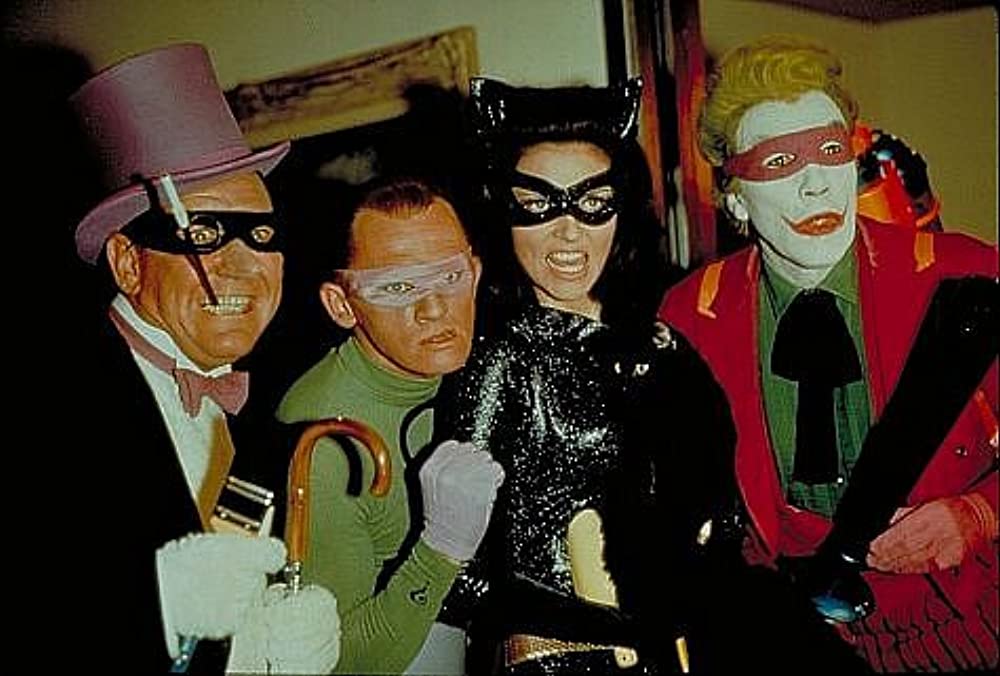
In the summer of… I want to say… ‘01 or ‘02, I remember having a sleepover with a friend who brought over a few DVDs for us to watch. The selection contained Keanu Reeves’ football dramedy The Replacements, the endlessly-awesome Jackie Chan’s First Strike, and the 1966 film version of Batman starring Adam West and Burt Ward. It was my first introduction to this iteration of the Dark Knight and, after my friend drifted off to sleep in his Star Wars sleeping bag, the Wild Cherry Pepsi-infused blood in my veins coursed through me at such a raging, unceasing pace that I was unable to get a lick of sleep. And, so, I did what any kid would do in that situation: I continued to shotgun more Wild Cherry Pepsi and I watched Leslie H. Martinson’s Batman about 4 or 5 times.
Why did I tell you this story? Because it’s the cutest and most anecdotal I care to get about the film, which I admittedly have not revisited since that fateful, Wild Cherry Pepsi-sponsored evening. Over the years, I’ve caught pieces of it on television, but never to any substantial degree. The fact that so much of it remains clear as day in my memory is a testament to how iconic the film is, by which I mean: iconically dorky, hilarious, and flat-out fun. It’s worth taking a look at if you’ve got even a fleeting interest in the character, or especially if you’re like me, and appreciate the examination of the same character’s filmic evolution over decades of time.
Where we started with Batman in the 1939 Detective Comics #27 to where we arrived with the 60s Adam West embodiment is a historically captivating evolution in itself, not to mention to now 50+ years following this 1966 entry, and the now-six different actors’ takes on the character in live action form, not to mention the countless animated iterations of him. 1966’s Batman is no feat of filmmaking (perhaps for the time in which it was made, but even then… citation needed) like some of the more recent entries are. The sheer buffoonery of Adam West and Burt Ward’s antics, not to mention Cesar Romero’s unjustly underrated performance as the Joker, should be enough for you to seek this one out if you’ve never crossed paths with it before. Go ahead, rent it on iTunes, get yourself some Wild Cherry Pepsi, and embrace your inner cornball.
MVPs: This is one of the finest lineups of Batman’s most famous baddies, led by the incredible Cesar Romero as the Joker. Rounding out that lineup, you’ve got Lee Meriwether as Catwoman, Burgess Meredith as the Penguin, and, having the time of his unitard-wearing life, Frank Gorshin as the Riddler.
Best Quote: It’s not one quote. It’s an entire scene. And it’s obviously this one. Enjoy, friends. (The shark was a close second for the title of MVP, to be honest.)
9. THE LEGO BATMAN MOVIE
2017
Director: Chris McKay
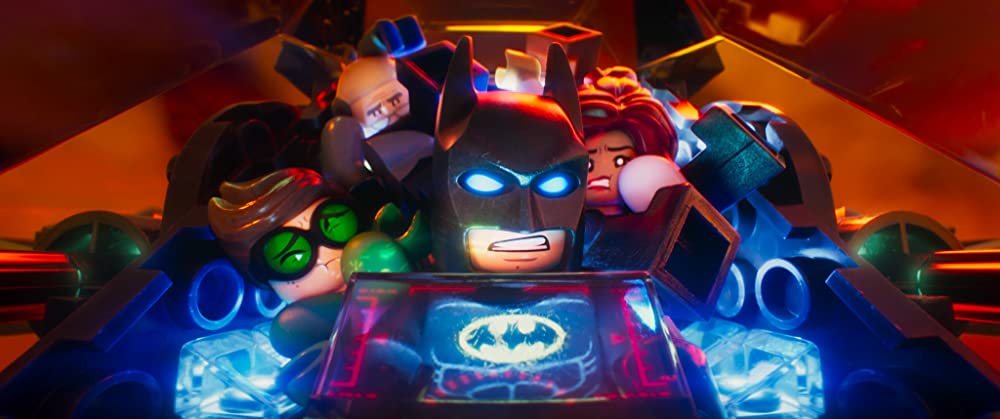
This is easily the funniest Batman film, especially considering it’s literally a children’s comedy, which ultimately makes it a bit too cute for its own good at points. That said, the unadulterated enthusiasm with which The Lego Batman Movie moves is astounding, and the intelligent-beyond-their-years childish humor spits out jokes at such a breakneck pace, it demands a rewatch after the first 5 minutes alone. The voice cast is an out of control roster of star power (Will Arnett, Michael Cera, Ralph Fiennes… just…go look at the IMDb page), and their all-in performances elevate what could otherwise be subpar, flashy, kiddie fodder to heights that enable the film to be enjoyed just as much (if not, at times, more so) by adults. All of the DC and Batverse in-jokes land especially well after having rewatched nearly every Batman film in the span of a week, not to mention some of the other fictional universes from which it pulls a few great cameo players (Jemaine Clement’s eye of Sauron does great work). Lego Batman is a wholly entertaining take on the character and his pathos, where the story is permitted to be as thematically obvious as necessary to drive its point home, all without sacrificing the integrity of the comedy that fuels it: Batman is vain, alone, and depressed, and maybe he doesn’t want to be anymore, but he’ll never admit it. Hilarity ensues.
MVP: Zach Galifianakis’ voice work as the Joker is tops. He should be doing more voice over stuff. He should be doing more stuff in general. He should have gotten an Oscar nod for that first Hangover movie. Zach Galifianakis hive rise up.
Best Quote: There are a ton of amazing bits and one liners to choose from. A stand-out made even funnier by Will Arnett’s consistently dynamite line readings : “I don’t talk about feelings, Alfred. I don’t have any, I’ve never seen one. I’m a night-stalking, crime-fighting vigilante, and a heavy metal rapping machine. I don’t feel anything emotionally, except for rage. 24/7, 365, at a million percent. And if you think that there’s something behind that, then you’re crazy.”
8. THE DARK KNIGHT RISES
2012
Director: Christopher Nolan
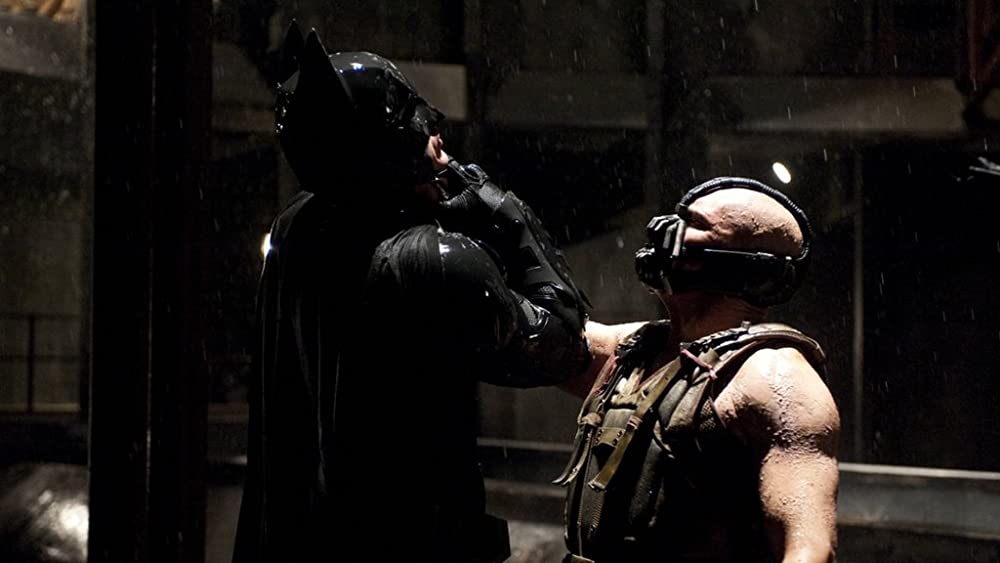
The follow-up to the most successful comic book movie of all time was never going to be easy, and it certainly wasn’t going to be crowd-pleasing. But Nolan stuck to his guns, and completed the arc of the story he set out to tell in Batman Begins, as opposed to fan-servicing his way to doom and failure by trying to recast and/or replicate the gaping hole left by Heath Ledger. In a lot of ways, The Dark Knight Rises is more of a direct sequel to Batman Begins than The Dark Knight. The immediate aftermath of The Dark Knight, in which the Caped Crusader is on the run from the law in the wake of the Two-Face fiasco, is the most direct thread carried over to The Dark Knight Rises.
Ask me underneath the right planetary alignment when I’m well-enough fed and rested, and I might even tell you I think The Dark Knight Rises is better than The Dark Knight. That’s not what I’m up to here, and this final chapter of Nolan’s trilogy ranks far lower on my list than the second act because, at the end of the day, The Dark Knight is objectively a better film. It’s got a tighter script and a clearer directorial focus, whereas Rises is a little all over the place and, here and there, buckles ever so slightly under the weight of its own enormity. But The Dark Knight Rises exists on that massive scale (a scale that Nolan would go on to emulate in films like Dunkirk, Tenet, and even more massively-so with Interstellar) because it has to, because the natural progression and escalation of stakes– something Nolan understands better than most– demands that this third and final chapter operate as the be-all, end-all to the existence of this version of Batman’s life and world, lest all the effort they put into the trilogy fizzle out in a whimper, rather than this 165 minute explosion of visual exhilaration and emotional satisfaction.
MVP: It’s a tie. Gary Oldman plays Jim Gordon like a cop that maybe knows it’s kind of shitty to be a cop. His take on Gordon is more grizzled and far less boneheaded than Pat Hingle’s between the Burton and Schumacher entries. Oldman is a knockout in all three films, but Rises provides the character, and the actor, the opportunity to tie a beautiful bow on this third and final act of the character.
Additionally, Michael Caine is given the most to work with that Alfred’s ever had, in terms of emotional depth. It’s easy to write Alfred off as the butler, the stand-in father-figure, the wise old sage that’s always there to pick Bruce back up onto his feet. Caine’s Alfred does all that, but it would have been ignorant of the Nolans to squander the level of talent they had on their hands in the form of Michael Caine by belittling the character and cornering him into the ways in which he’s already been played out.
You know what, now that I’m thinking about it, Tom Hardy f*cking rocks, too. Slap a mask over half of Tom Hardy’s face and he’ll still do better work than half the actors in Hollywood without any facial impediments. His Bane is terrifying and intense, which are attributes rarely associated with the traditionally brutish, often-blockheaded side-villain. Despite the third act twist that it wasn’t just him pulling the strings all along, this version of Bane is one of the better primary antagonists of comic book film lore and we’ve got Tom Hardy’s performance chops to thank for that.
And! Christian Bale delivers a deeply felt and fitting third-act performance of the character he helped reinvent and reinvigorate. Christian Bale is very, very good. Actually, you know what? This entire ensemble straight-up slaps. Everyone gets MVP. Good job, everyone.
Best Quote: “That’s a lovely, lovely voice.” Like I said, Tom Hardy can do more with a mask and some screwy voice work than most actors can do under normal circumstances.
7. ZACK SNYDER’S JUSTICE LEAGUE
2021
Director: Zack Snyder
Full Review: 7 Reasons Snyder Succeeds
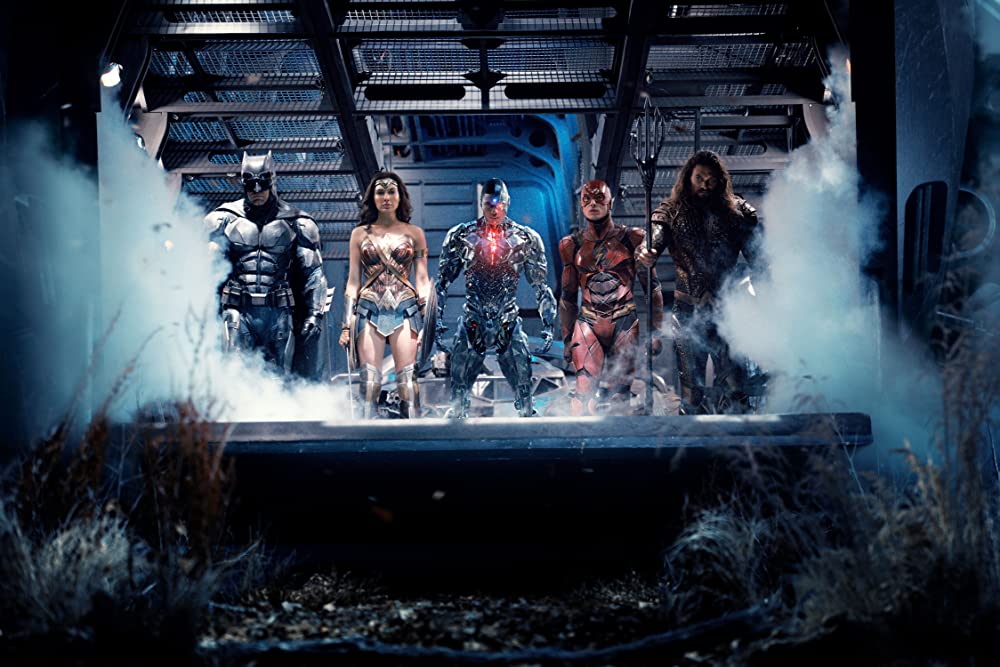
Part of the criteria of this list dictates that the films must have had a theatrical release, otherwise there would be way too many Batman flicks to count, and I would have undoubtedly begun to suffer from Bat-fatigue. It would have been a whole thing, I would have complained about it a lot to my partner, and everyone would have suffered because of it. So, that stipulation was made, that the film must have been released in theaters at some time. That being said, we make the rules so we can break them, right?
In the spring of 2016, production on Justice League, directed by Zack Snyder, was well underway, and things weren’t going great. Warner Bros. was not happy in the immediate aftermath of Snyder’s previous DCEU effort, Batman v. Superman: Dawn of Justice, performing so negatively. Development hell this, production woes that… Ultimately, Warner Bros. decided to screen an early cut of Justice League for some folks to try and get a read on whether or not Snyder’s direction was to be trusted. Ultimately, it didn’t matter: after a personal tragedy in Snyder’s life took center stage, the director stepped down in the midst of post-production during early 2017, and J*ss Wh*don was inexplicably hired to pick up the pieces. What Wh*don did from there was nothing short of an abomination, putting it through two months of reshoots during the summer (ahead of its fall release date) which included the famous Henry Cavill mustache incident in which his Mission: Impossible – Fallout mustache needed to be removed with CGI for Justice League because Cavill was also in the middle of shooting MI Fallout when the Justice League reshoots had to take place. JESUS CHRIST, I don’t care about any of this, I just want to talk about Zack Snyder’s director’s cut. Anyway, it goes without saying that Wh*don’s version of the film (derisively and aptly nicknamed “Josstice League”) sucked a great deal, prompting fans to rise up and demand that Warner Bros. #ReleaseTheSnyderCut. Finally, in 2020, Warner Bros. and HBOTJMAXX made everyone lose their collective minds when it was announced that they would, in fact, be releasing the Snyder Cut on the streaming platform for all to finally enjoy. Ok. Now we can get to the good stuff.
Zack Snyder’s Justice League is a work of epic proportions. The 242 behemoth, broken up into multiple episodes, expands on the original plot by including a number of additional scenes concerned with backstories, mythos, and (my absolute favorite) even more world-building. Needless to say, it’s messy, but there’s a difference between being messy and being a mess. That difference is Zack Snyder’s version and Wh*don’s, respectively.
This film follows, for the most part, Ben Affleck’s Batman, as his struggle to bear the weight of having been responsible for Superman’s death eats away at his cavernous bat-brain. The story, essentially, is a “getting the band together” type of deal, where Batman goes to the far reaches to enlist the help of Jason Momoa’s Aquaman, Ezra Miller’s Flash, and Ray Fisher’s Cyborg to join up with him and Wonder Woman in an effort to stop this scary alien guy Steppenwolf (not the band, also not the Chicago theatre company) from uniting these motherboxes that DC big-bad Darkseid is hell bent on collecting so he can take over the universe or something. The plot itself is pretty standard superhero stuff but, oh yeah, along the way they resurrect Henry Cavill’s Superman, and he is MAD. And you know he’s mad because his Superman suit is black instead of blue and red and gold. Intense stuff.
I’m being facetious there, but it’s not meant to take away from the fact that Zack Snyder’s Justice League is a work of art, and it being an honest restoration of the artist’s original vision is reason enough to give it the time of day. But if that still isn’t enough for you: how about because it fucking rocks. The film carries the torch passed on from BvS: DOJ in that the question of “why superheroes?” is never treated like thematic fodder for lack of something more interesting to do. Zack Snyder’s Justice League posits a world in which the solidarity of a few, banded together, saving each other (and, you know, the world) from the depths of their own solitary despair is maybe the reality we should be cultivating for ourselves. It’s a bold commentary to stake ownership over, but Snyder’s vision and, if we’re being honest, insanity as a filmmaker is exactly the right one that’s big and brave enough to pull it off.
MVP: The technical MVP goes to the delicious 1.33:1 aspect ratio! Thank you, Zaddy Zack. But otherwise, Ezra Miller pulls out all the stops as The Flash, and the character’s climactic act of heroism that saves the entire world, along with his newfound super besties, is one of the single coolest sequences on film. Ray Fisher as Cyborg, who has arguably the most emotional arc of the film, does equally amazing work that crescendos with the…
Best Quote: “I’m not broken. And I’m not alone.” Cyborg’s emotional journey comes to a head at this moment, one of the many scenes in the film that did, in fact, make me cry! Spoiler alert with that video if you haven’t seen the film yet but, if you have, enjoy. And, if you haven’t seen it yet, what are you still doing reading this? You’ve got 242 minutes of cinema to watch. Chop chop, little onion.
6. BATMAN & ROBIN
1997
Director: Joel Schumacher
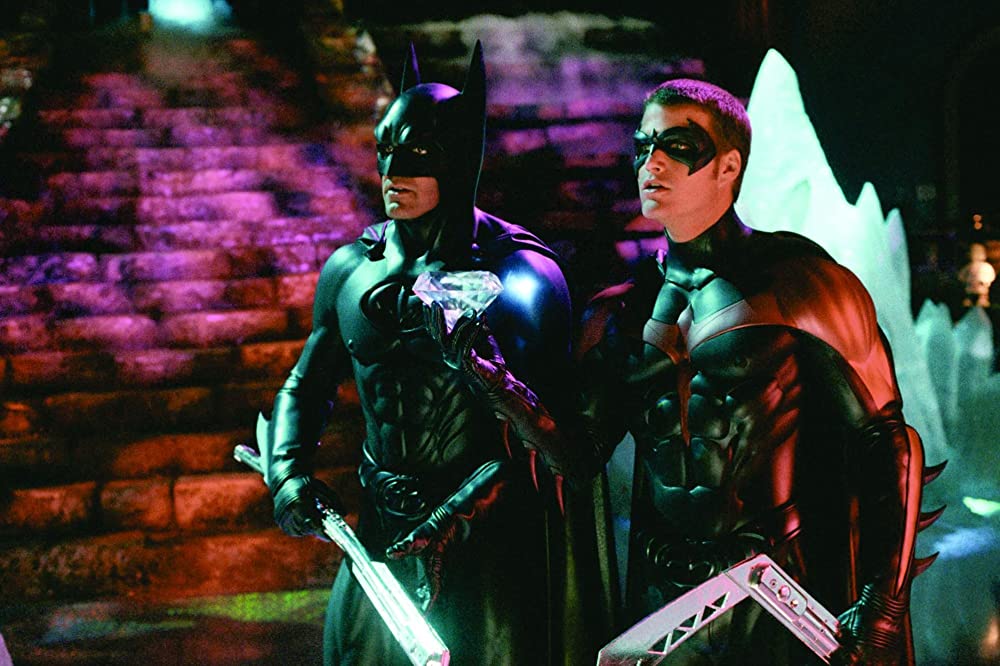
Look, I know ranking this entry so high is a fairly dissenting opinion; Batman & Robin hasn’t exactly been lauded in the 25 years since its release. That being said, and as I’m sure I’ve said before in some of my rankings for Loud & Clear, I’m the one writing this article and you… *checks notes* are not.
Guys. IT’S CAMP. It’s been camp the whole time. How could we have been so blind? I rewatched Joel Schumacher’s final Batman entry in anticipation of this ranking as I’ve not seen it since probably 2002, when I last would have been parkouring around my living room in Batman pajamas with this in the background, doing my utmost to disturb our downstairs neighbors at the time. Having last seen this 20-ish years ago, and my only interactions with it in between were seeing how maligned it’s reputation has become on the internet, I didn’t go in with very high expectations and, in fact, was prepared to skip around as needed, if not turn it off after, like, 30 minutes. But I watched– nay– was captivated by this bad boy from beginning to end. It’s an absolutely batshit (pun extremely intended) take on the Caped Crusader and his crime-fighting pals in all the right ways, and the suggestion of anything otherwise is a clear indication that you’ve grossly missed the mark.
The whining and complaining about this being the most inept, least essential, and flat-out worst Batman movie is nonsense and, if we’re being honest, a pretty shallow and pedantic take on what is likely the be the most fun you’ll ever have with a live-action iteration of this character that’s now been effectively doomed to an eternity of exponentially-increasing, gritty-for-gritty’s sake, melodramatic goth-ness and flagrant humorlessness. To each their own, of course; I’m a recovering emo myself and have had my share of going completely apeshit over the photos of Robert Pattinson in costume without the cowl but with the painted black eye circles. That being said: get your head out of your ass. By taking Batman & Robin too seriously, you’re undermining the thesis of the film’s existence entirely, and missing out on the funniest, most entertaining live-action version of the character we’ve ever gotten. All of that isn’t to say that the darker depictions don’t not work, but the further we go in that direction, the less we’re able to conceive of (and enjoy) a reality in which this character and their films are allowed to have fun.
The puns, the nipples, the hokey-brilliance of the physics-defying stunt choreography… it’s all there. And the PERFORMANCES. Clooney knows what this is and he’s here to bring his Clooney charm to the table in a way only a hotasfuck 90s Clooney knows how to do. And you need someone with the subtle charisma and intellect to know how bonkers it all is in order to play off of the boyish “I’m getting paid handsomely to be here so I’m not going to question it” all in-ness of Chris O’Donnell. Batman & Robin also features the best material Michael Gough’s had to work with as Alfred; this iteration grants him a storyline worthy of his (and our) time, and the relationship between him and Bruce is very sweet.
Arnold Schwarzenegger is out of control. His Freeze is so over the top in all the right ways. How do you make a robot snowman exist in a real human form outside of a comic book? You get Arnold Schwarzenegger to shave his head, paint himself blue, and deliver every snow pun under the sun with the biting enthusiasm of someone that’s just been paid $25 million and given top billing over the lead actor in the titular role. Plus, his delivery of “Very nice,” gives Borat a run for his money.
Between the nipples and every second of screen time featuring Uma Thurman’s Poison Ivy (“My garden needs tending…”), this is one veerrryy horny Batman flick. Maybe not quite as horny as Batman Returns, but it’s up there. No contest, though, that it’s easily the funniest live-action Batman we’ve ever gotten. Bane’s incoherent one liners? The bat-credit card bit? Freeze’s cronies dressed like hockey players straight out of the Mad Max universe, flying every which way on screen? Outstanding stuff, simply exquisite. Quite frothing at the mouth over your cinematic pretentions, throw this movie on, and have the time of your goddamn life. In fact, call me when you do. I already want to watch it again.
MVP: John Glover. Best known for his marvelous scenery-chewing work on Smallville (of which I’m currently deep in the midst of a rewatch), Glover has all of about three or four minutes of screentime, but he makes the most of every microsecond. His performance is the stuff of cartoonery (he clearly gets what’s going on) and I can only imagine Schumacher’s direction for him to have been something along the lines of “do Gene Wilder from Young Frankenstein but more coke-fueled and even hornier.”
Best Quote: Chris O’Donnell’s consistent wait-what-am-I-doing-in-a-Batman-movie delivery of his dialogue really hits his stride with “I hate to disappoint you, but my rubber lips are immune to your charm.”
5. BATMAN RETURNS
1992
Director: Tim Burton
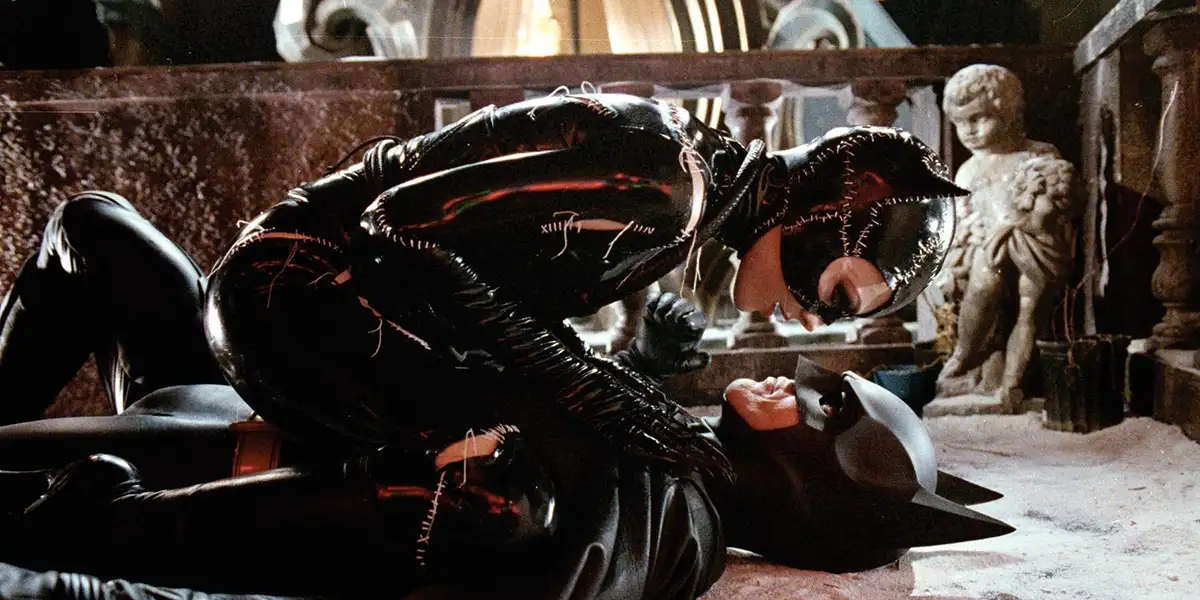
 loudandclearreviews.com
loudandclearreviews.comWith Batman Returns, Tim Burton makes the argument for leaving the realism out of superhero movies without sacrificing any inherent darkness or real world stakes that culminate in one hell of a Batverse entry. The realist renaissance ushered in by Nolan’s Dark Knight trilogy convinced everyone and their mother that it should be the new normal (don’t get it twisted; those films are incredible and, at that time in the mid-2000s, the genre was in desperate need of an overhaul). But it wasn’t soon before long that this mindset got beaten to a pulp by the Marvel machine and their excruciating attempts to ground every single one of their films in some socio-political, thisisYOURworld nonsense that, for one thing, they aren’t always the best people qualified to be telling those kinds of stories– they needn’t shy away from it if it makes honest-to-gosh sense, but the degree to which they belabor most of their commentary with the unsubtle tactlessness of a freshman year screenwriting major at Pace is becoming so tiresome, not to mention relatively tone deaf. For another thing, going to see a bajillion dollar-budget action romp that reminds me of the dark times in which I’m already living on this planet is not what I’m after when I pay my hard-earned dollars to go to the cinema for an afternoon; I’m there to escape, and to be entertained. In other words: I’m just trying to have a good time.
Look, I’m not saying everyone gets it wrong, allowing superhero films to dip a toe into the pool of realism: Nolan’s Dark Knight trilogy, Rami’s Spider-Man flicks, and Snyder’s DCEU efforts in particular excel at this. Sometimes, though, a filmmaker regards the world we live in simply as the bare minimum means to remind us that, sure, these are real human people on a version of planet Earth, and that’s all the realism Tim Burton needs to make Batman Returns work. In it, Gotham exists (aptly) in a sort of snow globe– There might be a world out there somewhere, but the people here aren’t concerned with it, and we as spectators need not crave the knowledge of what’s going on beyond the gorgeously conceived art direction of the Gotham City high rises in this snowy caper.
Batman Returns expertly employs just the right amount of comic book tomfoolery (something its immediate successor leans too far into), sumptuous production design and art direction (something its predecessor set the tone for), and just a modicum of realism (something future iterations of the character run wild with) so as to marry the previous two elements with it to ultimately, successfully, make one banger of a Batman flick.
Also, it’s a Christmas movie, AND it’s HORNY. #MakeBatmanHornyAgain
MVP: Keaton’s instincts as Bruce Wayne once again prove superior to most other actors that have taken on the role. However, it goes without saying that the show-stopping MVPs of this entry are Danny Devito (as the Penguin) and the [insert Leo biting his fist gif here] incredible Michelle Pfeiffer (as Catwoman). Their performances are so fun and unhinged, yet so focused and pointed, and the energy they bring to these absolute chaos characters is a real pleasure to indulge in.
Best Quote: “It’s vichyssoise, sir. It’s supposed to be cold.” Michael Gough’s line readings are, in a word, exquisite, and this is one of my personal favorites.
4. THE DARK KNIGHT
2008
Director: Christopher Nolan
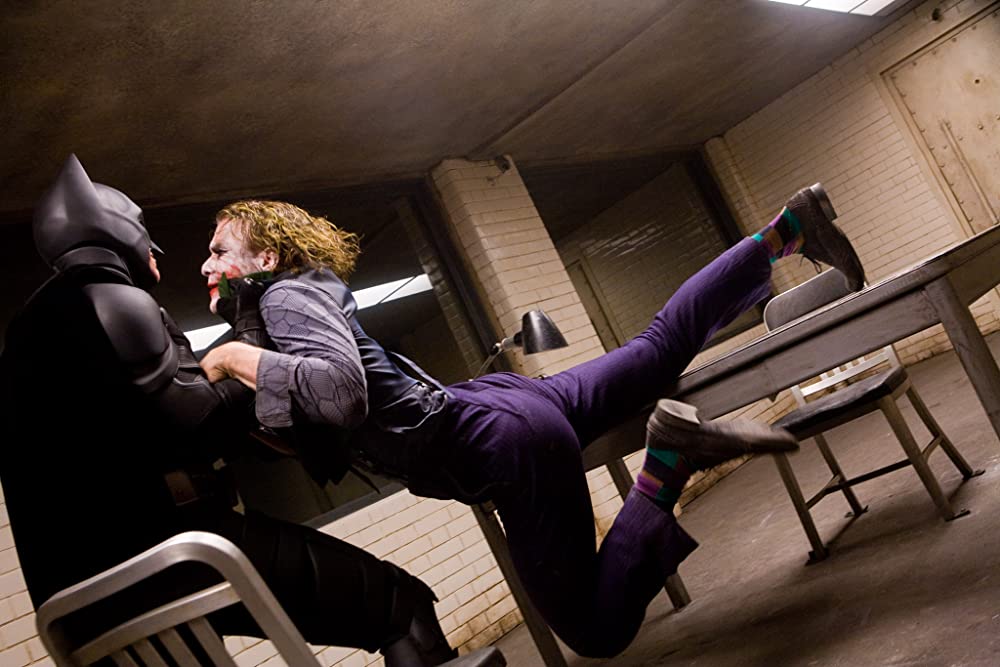
Just as Burton’s Batman Returns made the argument for letting Batman and his world exist in a bubble removed from the real world, Christopher Nolan’s The Dark Knight finally got the balance right. Let’s cut to the chase: in 2008, everybody with a pulse and even a passing interest in film absolutely freaked it when Nolan’s now-masterpiece The Dark Knight dropped. Following through with the genre-redefining success of his 2005 effort Batman Begins, this sequel proved one of the most successful comic book films of all time, not to mention one of the most beloved and highly-regarded pieces of cinema by people who do actually know what they’re talking about. The artistic craftsmanship balanced masterfully with the popcorn-movie explosiveness we want out of a superhero flick that was poured into every second of Nolan’s 152-minute banger is, for my money, still unmatched by another in the genre to this day.
Pick your poison: the script is a mechanical and thematic labyrinthine-masterpiece; the visual effects and cinematography, particularly the employment of IMAX cameras, was revolutionary and mind-blowing; the score ranks among the all-time greats of the 21st century; and the performances, from top-to-bottom, are some of the most thoughtful and praised of the genre. So, why is it only number 3 on my list?
The thing is, with the exception of Batman Forever in the number 12 spot, there’s a lot to love about all of these films. I can even see how, for some, Batman Forever may hold a special place in their heart. In fact, the top 5 on this list could be entirely rearranged in a variety of different orders, depending on the day of the week and my mood. Call it recency bias, call it being an indecisive double libra, call it what you want (yeah) call it what you want to, Taylor Swift: the order of this list isn’t necessarily meant to reflect which of these films are absolutely superior over the others, but more so a subjective defense of my own feelings for a character and his world that I’ve been enamored with for nearly my entire 30 years in existence on this planet.
That was a very roundabout, politician-like answer I’m sure Aaron Eckhart’s white knight Harvey Dent would scoff at. The fact that The Dark Knight ranks at number 3 on this list and not number 1, as you’d find on nearly every other Batman ranking on the internet, is because in the year of our lord 2022 (citation needed), The Dark Knight really flexes its 2008-ness. It doesn’t necessarily serve as a scathing detriment to the film, but the fact that Christopher Nolan’s trilogy presumably takes place in or around the years in which they were released is one of the only ink-stains on its record. The mid-aughts to the early 2010s felt in retrospect, and even at the time, like such a transitory period in the way of cultural and societal aesthetics. Fashion was still caught in this weird in-between of the 90s and what we’ve ultimately migrated toward and solidified today. Technology was there, but not all there; smartphones were beginning to burst onto the scene but, at the time of this film’s release, phones with clickable buttons and keyboards still ruled the market (god, I miss my Blackberry). The Dark Knight itself serves as a pseudo-time capsule in its thematic utilization of technology and the subsequent commentary on surveillance and personal privacy. To that end, it doesn’t quite hold up. To every other end, it’s a masterpiece. The script is tight as can be. The performances are there. Nolan’s directing hand is at its most focused. And Hans Zimmer’s score, to the surprise of absolutely no one, slaps every potato this side of Ireland. Still, it’s difficult to ignore the time period by which The Dark Knight is effectively encumbered. The number 2 spot on this list exists within that retro-futurist, 1920s/30s/40s-ish era from which peak Batman content prevails, and the number 1 spot is so obliteratingly now, it’s hard not to be overcome by its topicality.
MVP: Let’s talk about the terrifying, mesmerizing, Oscar-winning, and ultimately tragic elephant in the room: Heath Ledger. Heath Ledger this, Heath Ledger that, we’ve all heard it before, and we’ve been doing nothing but hearing it for the last…*counts on fingers*… fourteen years. The thing is: Ledger’s performance really is all it’s cracked up to be, and more. His Joker continues to stand the test of time (not to mention continue to come out on top of however many more versions deep we are of the character at this point… Joaquin Phoenix, Jared Leto, fingers crossed for Barry Keoghan…). His untimely passing in January of 2008, just months before the film opened, remains one of the most tragic modern losses in Hollywood, but that one of his final screen performances was this towering inferno of unpredictable, chaotic proportions is nothing short of a gift to lovers of the character, the actor, and the craft.
Best Quote: As predictable as bestowing the title of MVP upon Heath Ledger is, the best line from The Dark Knight is often the most popularly quoted, but all rightfully so: because it’s an amazing line, guys. “You either die a hero or you live long enough to see yourself become a villain,” is a line written with such universality that people have probably begun using it/versions of it now without realizing its origins, not to mention it boils down and encapsulates, in one single sentence, the thesis of the entire film. Those Nolan Bros. really know what they’re doing, huh…
3. BATMAN: MASK OF THE PHANTASM
1993
Directors: Bruce Timm & Eric Radomski
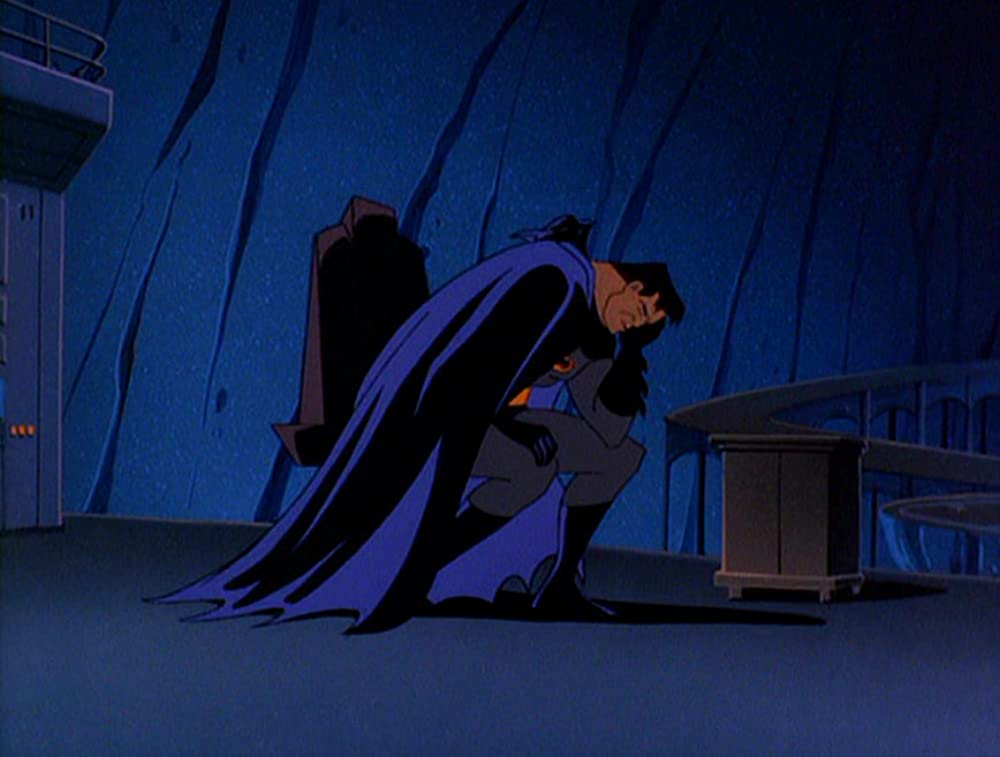
The vast majority of Bat-flicks (not to be confused with Bat-fleck) use Bruce Wayne’s past as a fleeting excuse to weigh down the character with spurts of moody broodiness in tiny sequences between the big set pieces with lots of fighting. But Mask of the Phantasm’s story hinges upon the close examination of Bruce’s past trauma, and how the Batman persona became this escapist means to never have to own nor face it. That this is the single most interesting thing about the character yet it’s rarely given the thoughtfulness and focus it deserves makes Mask of the Phantasm’s inclusion of it as an essential component to the story’s fabric reason enough to deem the film one of the best Batman efforts of all time.
To illustrate the Bruce/Bat dynamic and what it means for the human being that bears the burden of this duality, this film offers up detailed glimpses into Bruce’s past via a recurring series of flashbacks, which depict him grappling between his penchant for justice and the innate human desire for love. He chooses the latter, and it’s only when this decision is thrown back in his face that he fully commits to the Batman, literally and figuratively choosing the mask over (and in response to) the love that slipped from his grasp. As a direct result, Bruce Wayne feels more human than ever here, as opposed to a handsome flesh suit that’s only ever looking at his watch, going through the motions as playboy-billionaire until he can quietly slip out of that boring board meeting or lavish dinner party to don the cowl and ignore the other life he’s forced to live in the daylight.
Mask of the Phantasm is a film born and bred out of the height of Batman’s best iteration: the 90s animated series. It’s cheeky, moody, thrilling, mysterious, and heart-breaking in equal measure. Above all else, this offers us a glimpse into one of the most well-known characters in all of pop culture, probing such emotional depths of which few other filmic versions have cared to explore or even acknowledge. Mask of the Phantasm posits that the Batman is nothing more than an escape route, an addiction to which Bruce has become so reliant on, the lines of a secret identity and a wholly meaningful existence are obscured to the point that we (and he) never know, between the Batman and Bruce Wayne, which is the man and which is the mask.
MVP: Kevin Conroy and Mark Hammil. ‘Nuff said.
Best Quote: “Vengeance blackens the soul, Bruce. I’ve always feared that you would become that which you fought against. You walk the edge of the abyss every night, but you haven’t fallen in and I thank heaven for that.” Oh, Alfred. I’m not crying…
2. BATMAN V. SUPERMAN: DAWN OF JUSTICE
2016
Director: Zack Snyder
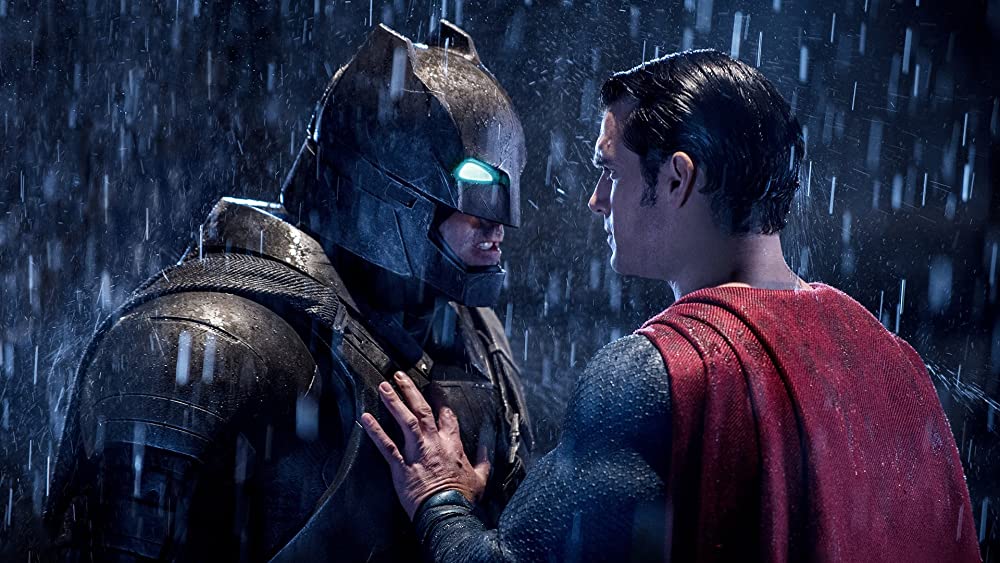
Joel Schumacher’s Batman & Robin works because the filmmaker possessed such a keen understanding of the rules of the universe in which it took place: it was silly, fun, chock-full of dorky puns, and featured a slew of scenery-chewing, over-the-top performances that were somehow, miraculously, successful. But it wasn’t a miracle: it was because the filmmaker knew the story he wanted to tell, and exactly how the players involved needed to walk and talk in order to accomplish that goal. Similarly, Zack Snyder understood, in 2016, what a superhero movie needed to be: it’s all about the stakes, baby, and the acquisition and enlistment of a group of players that were more than willing to commit to these stakes of the world he mapped out was the most crucial, make-or-break component of my holyshitI’mjustassurprisedasyouare favorite Batman movie: Batman v. Superman: Dawn of Justice.
I’ve spoken a bit in this article about my disdain for superhero films that have gone out of their way (to excruciatingly on-the-nose extents) to allegorically and/or literally frame the goings-on of their superheroes in a world that looks all too much like ours, burdening the protagonists with the weight of such moral/political/social/otherwise nonsense that the primary directive of a film of this genre shouldn’t be burdened with in the first place, all at the expense of the simple-enough target of being entertaining for us, the moviegoers. In the hands of ill-equipped filmmakers, that sort of weightiness gets lost in the sauce of trying to impart too pointed and heavy-handed a message about the world in which we live, ultimately jeopardizing our desire to have a good time at the movie theater. Zack Snyder doesn’t fall prey to such nonsense while still managing to tell one of the closest this-is-the-world-we-live-in superhero tales of all-time in his earth-shattering, heart-wrenching, gobsmacking entry in the Batman canon. Why? Because Zack Snyder knows what the fuck he’s doing, guys. You just aren’t ready to accept it.
Snyder is here to, yes, tell us a story about the world we live in, and the moral code (or lack thereof) that all members of society– from the littlest guy all the way up to the highest powers that be– operate within/outside of/adjacent to/tangentially with. His story is only a thinly veiled parable to the extent that its protagonists feature gods from outer space and billionaires in highest-tech military-grade armor beating the shit out of each other across the rooftops of cities that look a little too familiar to be total fantasy. Snyder offers a world in which the power of super(?)heroes(?) are put to question not as a means of frustratingly derailing the plot for lack of better substance, but to examine the legitimacy and trustworthiness (or lack thereof again, on both counts) of those aforementioned superheroes in the consistent and successive aftermaths of tragedy predicated entirely on their existence.
People have complained that Batman, drawn by the hand of Zack Snyder, is too brutal. He uses guns, he doesn’t think twice about killing bad guys, and he even says “fuck.” He’s not too brutal, because Batman has always been a reflection of the world in which he lives and serves, and Snyder’s depiction of the character is imbued with that core virtue to such an honest and aptly harsh extent that many viewers and long-time fans of the character wrote it off as a fault. But by this virtue, Snyder and Affleck’s version of Batman is an even more legitimate embodiment of the phrase iconized by Nolan’s Dark Knight trilogy: he’s not the hero we deserve, but (just barely) the hero we need. When a person, a people, a society, a world, genuinely deserve better, they may get it. But, for now, they don’t deserve better, and Affleck’s Batman’s not out here to try and give it to them; he’s out here to try and make sure that no one (read: Superman) eliminates the window of opportunity before anyone worthy has the chance to fill the position.
Now, this isn’t a Superman article, but I need to talk about him, because it’s hard not to talk about Superman when you’re talking about Batman, especially when we’re dealing with a film that characterizes both their protagonistic endeavors through such shared, entangled means (not to mention, you know, both their names are in the title). As evidenced by the very first thing we see Superman do in the present timeline of this film– not those “flashback” blips of him pummeling Michael Shannon through the Metropolis skyline– we come to learn that he doesn’t quite understand why doing too much of a good thing ultimately becomes not a good thing. Batman does, and that’s why Batman can get away with doing bad things in Snyder’s world, like killing people and saying “fuck.” Maybe Superman can’t wrap his head around this notion simply because he isn’t human, whereas Batman obviously is; Superman possesses this inability to understand the most innate human concepts, and repeatedly displays an unwillingness to bend to the politics set in stone by and in service of humanity when the stakes are as big as protecting the people he loves. This dichotomy– this one thing he doesn’t understand and this other thing he understands more than anything– makes him simultaneously the most flawed being on the planet and the most damningly-human being that’s ever lived:
Lois: “I just don’t know if it’s possible.”
Clark: “Don’t know if what’s possible?”
Lois: “For you to love me and be you.”
It’s reasonable to assume that in 2016, we, as a pop culture-hungry society of animals that just came off of Nolan’s uber-successful Batman trilogy, were not only ill-prepared to digest the version of the Dark Knight that Snyder had to offer when this film dropped, but that we were blatantly unwilling. As is usually the case, time has been favorable to this entry in the Batman canon, not to mention the greater DC universe of characters at large, giving us another captivating look at Henry Cavill’s flawed Man of Steel, plus serving as the launching pad for Gal Gadot’s Wonder Woman. The future of the Batman-Superman-driven DCEU looked grim in the wake of 2017’s disastrous cut of Justice League that was taken over by J*ss Wh*don, but 2021’s merciful retcon of that abomination by way of Zack Snyder’s Justice League is all the argument needed to pursue a future of Ben Affleck’s Batman and Henry Cavill’s Superman under the watchful eye and masterful hand of Zack Snyder. Snyder is out to tell us, possibly even more so than Nolan, that this world is burning, and if the people that have the power to put those fires out are too busy beating each other up, who will? Who even can?
MVP: Jesse Eisenberg is having a lot of fun with his Lex Luthor, but it’s the Alfred that Jeremy Irons brings to the table that’s such a breath of fresh air and the clear MVP of the film. Michael Caine’s Alfred packs a small punch but, for the most part, falls in line with the rest of the filmic Alfreds that are all cut from the same stuffy, Downton Abbey buttling cloth has only ever been good for a quip here and a chuckle there. But Jeremy Irons’ portrayal of the character is the first time we’ve ever seen Alfred with some much-needed edge. And those OUTFITS.
Best Quote: Bruce sums up his motives, questionable as they may be, in one grim, fell swoop: “We’re criminals, Alfred, we’ve always been criminals. Nothing’s changed.”
1. THE BATMAN
2022
Director: Matt Reeves
Read also: The Batman (Review): The Dark Knight Is Back and Better Than Ever
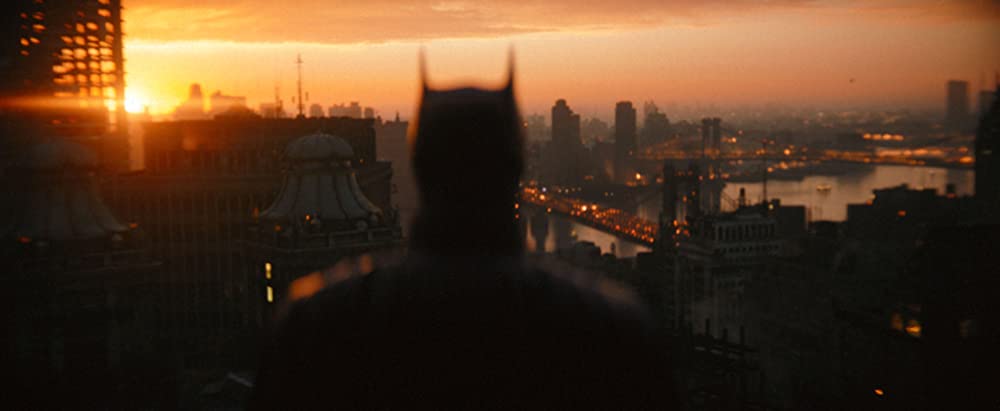
Folks will argue until they’re blue in the face that The Dark Knight is the best Batman film out there. Their arguments are not unfounded; The Dark Knight is a masterpiece of a cinema, and as good as it is due largely in part to its screenplay. It’s tight, moves at a fast clip, it’s complicated without being overly esoteric or self indulgent, the dialogue has real range, and the characters are fully realized with (mostly) satisfying conclusions. It also stands to its credit that Christopher Nolan is arguably one of the best filmmakers working today, with a handle on scope and scale the likes of which most filmmakers balk at, let alone try and execute successfully. These are, inarguably, two of the most enormously important qualities of a great film. The thing is, the qualities of a great film are not exactly the same criteria I’m looking for when it comes to a great Batman movie.
The Batman succeeds as much as it does for me because it checks off more “this is what I want out of a Batman movie” boxes than any entries that have come before it. Nolan’s Dark Knight trilogy excels in the high quality of its standard of filmmaking, plus some memorable performances, but is constantly mired by its inability to let the characters breathe and focus on anything other than the task at hand, not to mention how painfully time continues to reveal their garish “mid-2000s to early 2010s”-ness; Zack Snyder’s Batman efforts, divisive as they may have been, succeed in their f*ck-all approach to the character that no one had ever quite conceived of before on film and, for my money, Affleck’s performance of Bruce Wayne and Batman feel the most heartfelt the character(s) have ever been on screen, though the films themselves are never built around the character as the be-all-end-all Atlas-holding-the-entire-thing-on-his-shoulders (BvS is just as much about B as it is S, and Zack Snyder’s Justice League, led admirable by Batman as it may have been, is ultimately a group project that Batman simply does all the work for).
And the ‘89 through ‘97 entries are a mixed bag of of-their-time rompy triumphs and gets-better-with-age admirable failures (Batman Returns and Batman & Robin, respectively) but are nowhere near the levels of sheer impressiveness in their filmmaking nor their depictions of the characters as their 21st century successors.
The tone of The Batman is dark because the world it draws on the page must be dark in order for the story to make sense for us and for itself, not simply because it’s fashionable to be edgy and bleak. By this virtue, the characters in it don’t need to be all that redeemable, good or bad, by which I mean we don’t need to be spoon-fed reasons to be in love them; they’re just trying to get by and we’re along for the ride, especially when it comes to Batman himself, whose likability is so greatly in question not only by us but by this version of the character himself, apparently at constant odds with whether or not he even likes himself and the life he stubbornly refuses not to live. Plus it depicts this iconically-melancholic character alternatively known as the world’s greatest detective as an actual detective, putting the investigative business on an even higher pedestal than the big action sequences. When we do get some action, though, they’re still rooted in sense and purpose, with little-to-no expository flashy fight nonsense, even when it’s time for Batman to fight off a rabble of thugs or a band of henchmen.
Robert Pattinson’s version of Batman/Bruce Wayne as a semi-insolent, emo man-child with a no-chill attitude when it comes to lightening up is aaaamaaaaaziiiiing, and the one-track-minded conviction with which his performance of the character operates is somehow refreshing in its one-dimensionality; that an actor of his caliber doesn’t demand to play things with more depth other than the three-count bag of emotional tricks (angry, brooding, obsessive) but, instead, goes absolutely balls deep on this rotating triad of We Need to Talk About Kevin-levels of troubling emotivity is exactly what I’m looking for out of a performance of the comic book character that’s long been the most in need of therapy. He’s not a real person– by that I mean he’s allowed to be a cartoon. Somewhere along the line we started demanding that just because these originally-2D characters began to receive the 3D treatment, the emotional DNA was required to make the jump to multi-dimensionality as well. But why can’t a real human person play it like a comic book cartoon? There are countless attempts at bringing comic book characters to the big screen via live action that are as wildly unsuccessful as they are because they’re hell-bent on injecting them with real-world-ness and superheroes-are-people-just-like-you juice until they sputter out around the room like an untied helium balloon.
Look, I’m not here to act as the film’s defense attorney, because I don’t have to. You love what you love, and to each their own. Matt Reeves’ The Batman isn’t perfect. Not only am I not asking it to be, but perfection is subjective and a ridiculous metric, in equal measure. Asking or expecting a movie about a guy that dresses in black armor and paints black eyeshadow around his eyes and squirrel-suit glides off of skyscrapers is an even sillier demand than the premises of these movies themselves.
Silliness being said and recognized for what it is, this is one of the best shot and best scored comic book movies of all time, and you can take that to the bank come awards season next year. This is the best lit, shot, edited, scored, and sound designed comic book movie of all time. Every shot has such clear, thoughtful composition, as opposed to standard issue superhero joints that have some nicely conceived action sequences here and there but pay little attention to what artistry can be employed in, say, a simple two shot (Spider-Man: No Way Home– which I enjoyed for what it was– was an egregious offender of this, guilty of an entire film’s-worth of standard issue shots that were so poorly composed, they look like they’re CG when they’re not). Newly-minted Academy Award winner Greig Fraser and his team never ever pass up an opportunity to do something interesting with their framing, lighting, subjects, or usually all of the above and, for that, I’m grateful.
Michael Giacchino’s score had some big shoes to fill. Between the 90s-era Batman licks and the Hans Zimmer bangers of Nolan’s trilogy, orchestrating (pun intended) various theme suites to represent the Dark Knight and represent the world in which he bops around was no easy task. Not only did Giacchino meet the requirements, but he surpassed them, giving us the gift of one of superherodom’s best original film scores and best entries to the Batman theme canon (even if he does owe a little bit to the Imperial March…). Speaking of sound, how about that sound design? The first time we hear the Batmobile? The engine gets turned on and so do I. SWOON. Baby, you can drive my car… *bites lip*
And as if all that weren’t enough, they FINALLY gave us (me) a hot emo Batman. That’s it! Let me have this!
Congratulations, The Batman, you’re my new favorite Batflick.
The Batman was released theatrically on March 4, 2022. Read our article on why we love Batman!
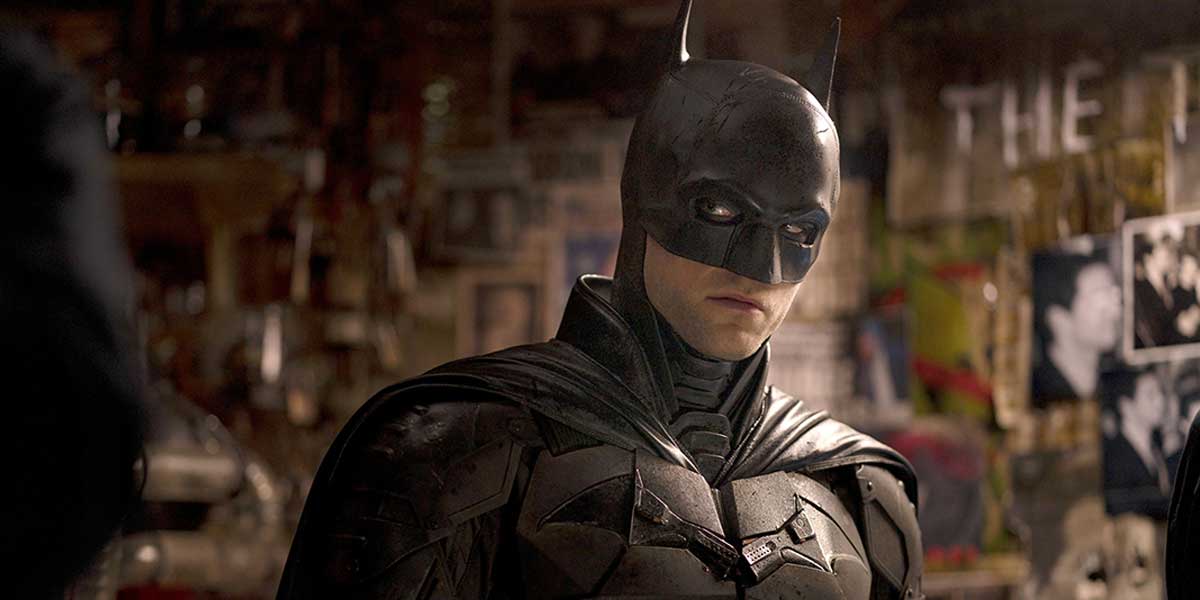
 loudandclearreviews.com
loudandclearreviews.com
